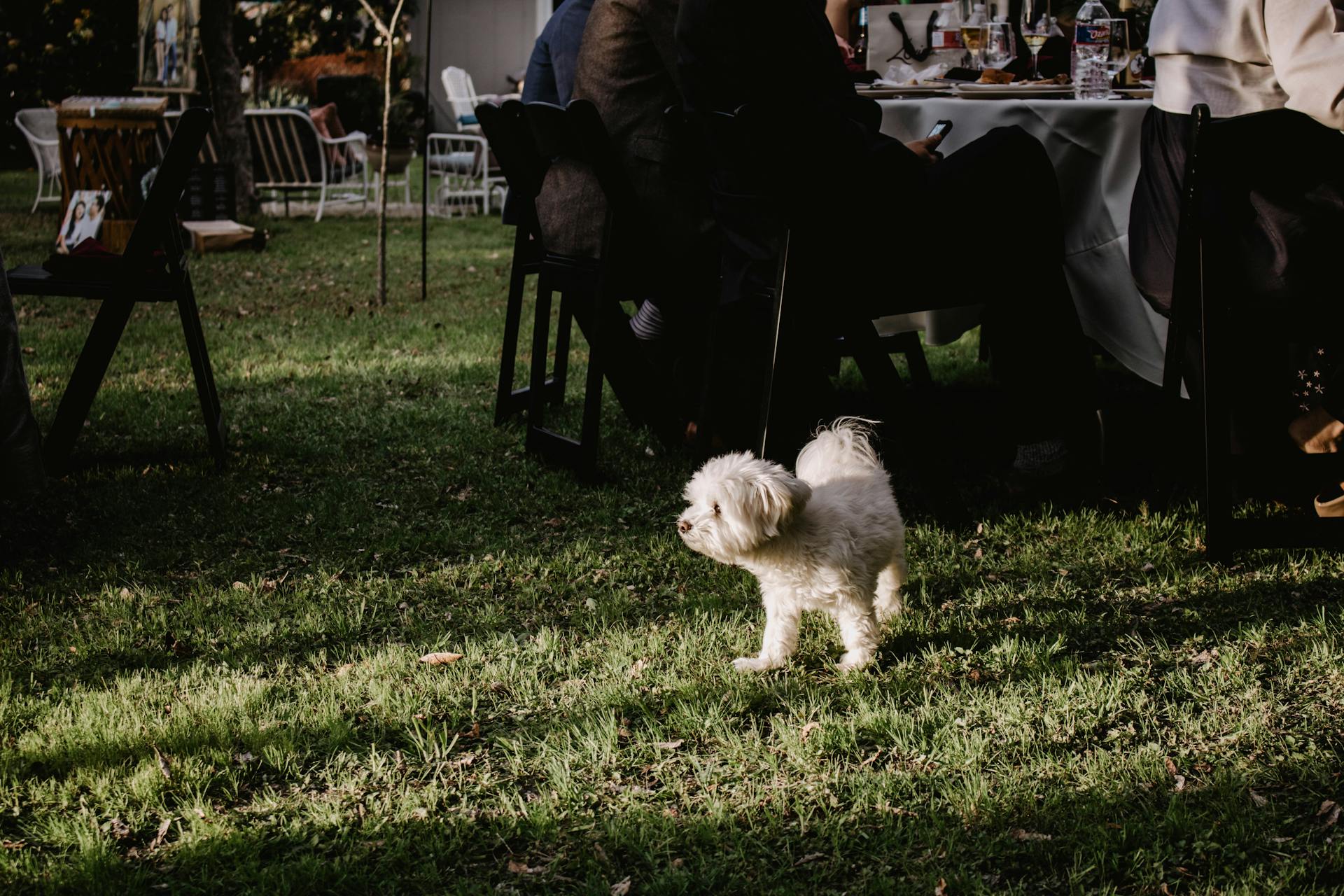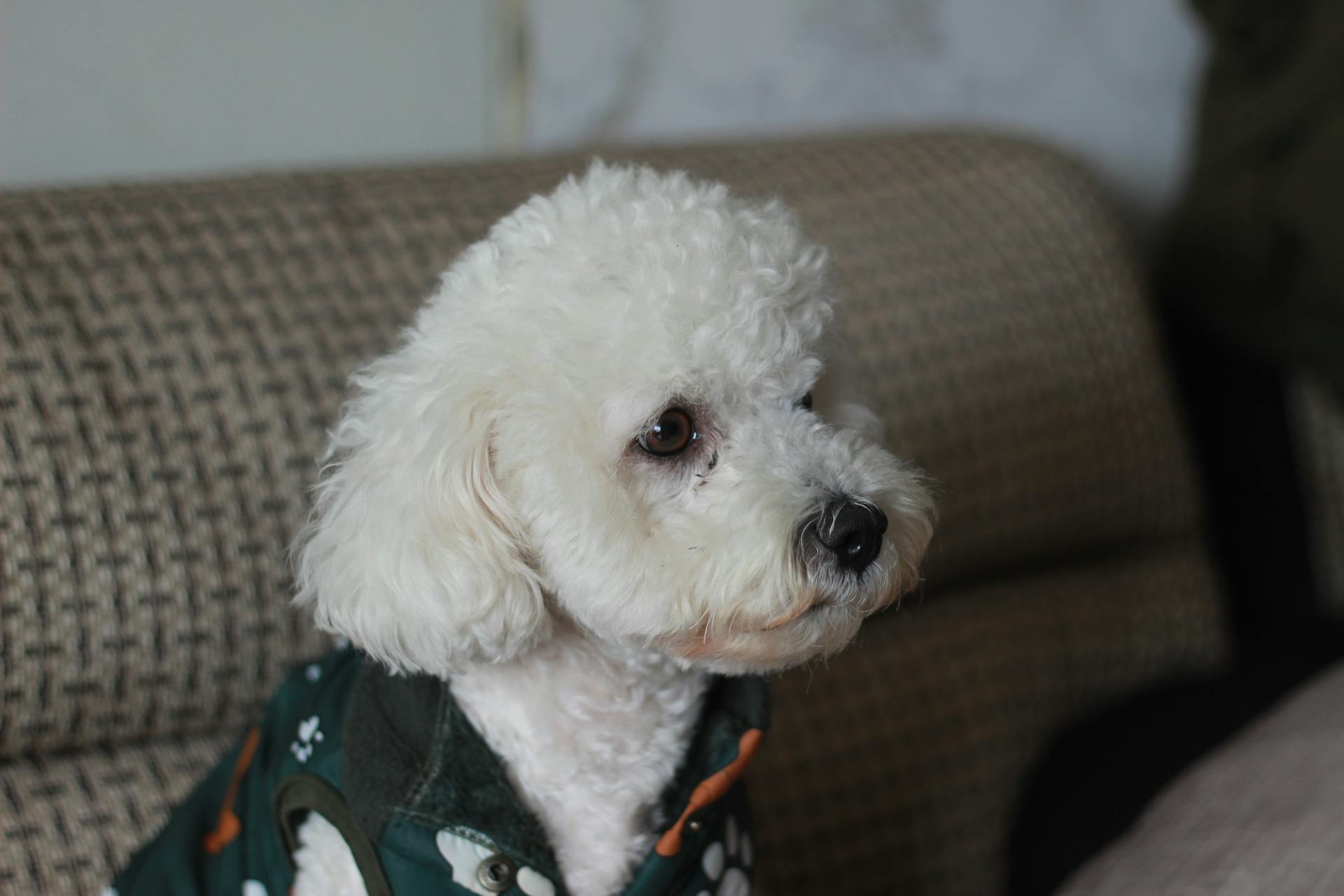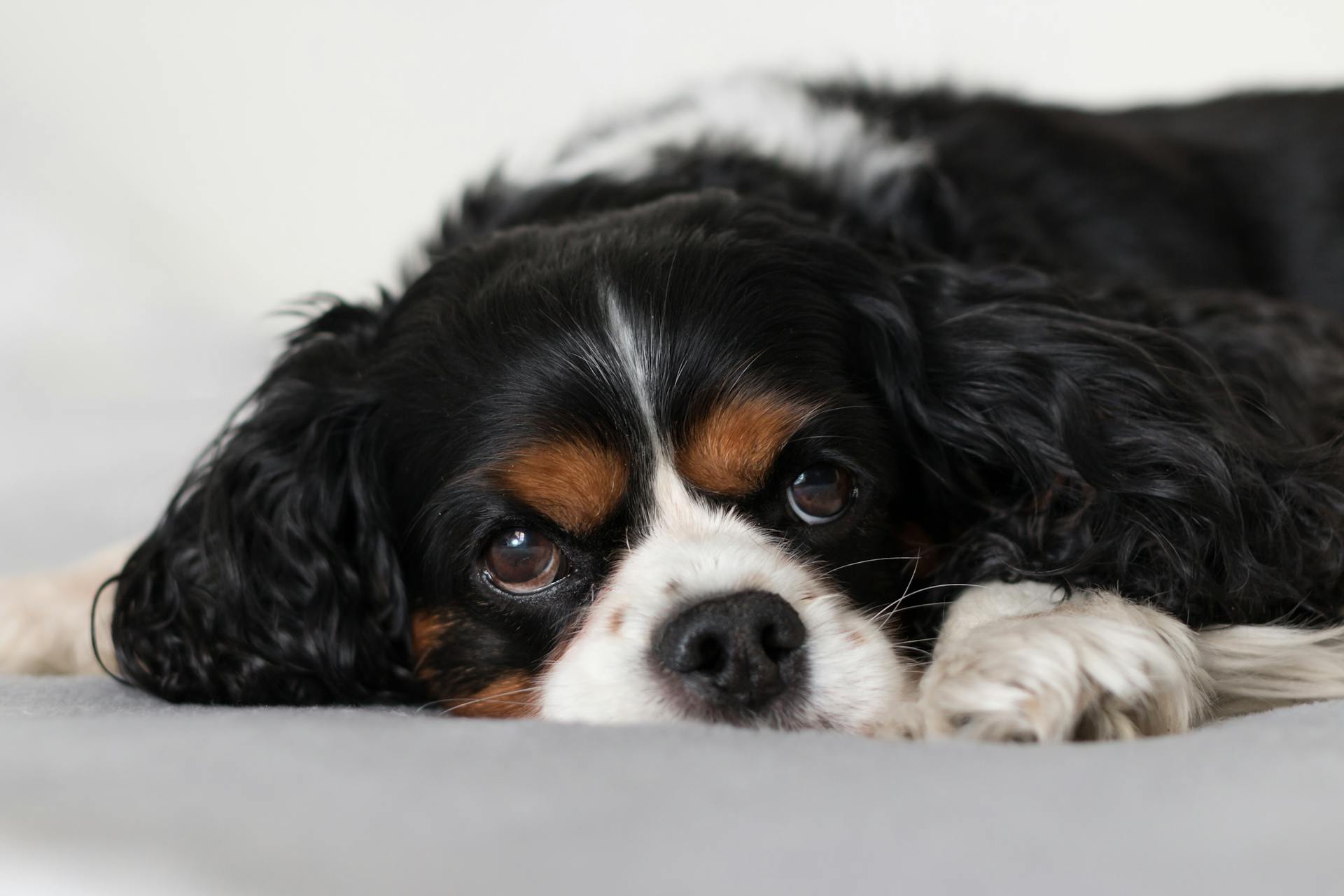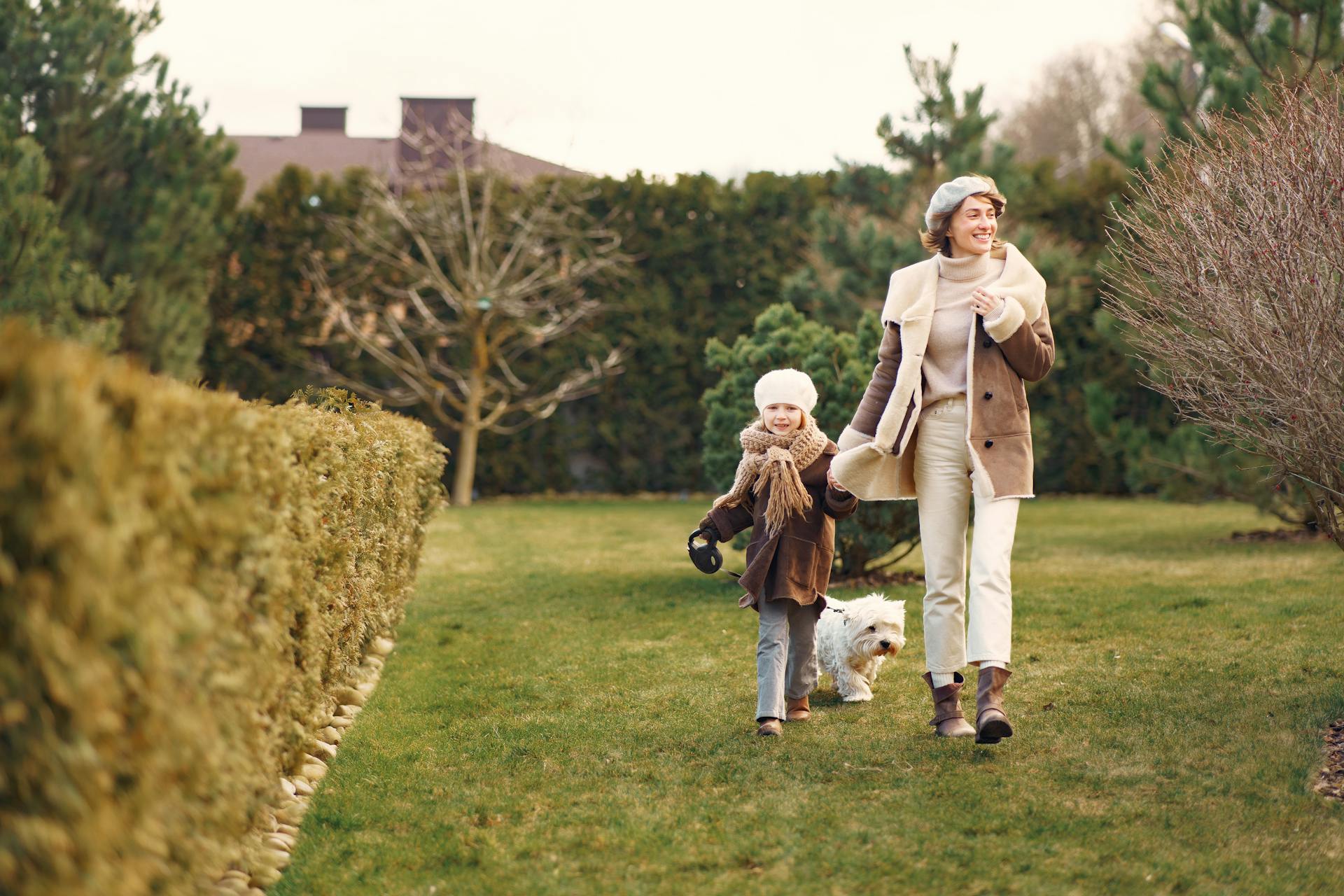
The Bichon Frise is a small, fluffy dog breed that originated from the combination of water spaniels and Poodles.
They typically weigh between 7-12 pounds and stand about 9-11 inches tall at the shoulder.
This compact size makes them perfect for city living or families with limited space.
Their low-shedding coat requires regular grooming to prevent matting and tangling, but it's a small price to pay for their adorable appearance.
Care and Upkeep
The Bichon Frise is a social butterfly that thrives on interaction with its family and loves to play.
They enjoy daily walks, but can also get enough exercise indoors through vigorous games, making them perfect for apartment living. Their small size means they need protection from larger dogs and even predatory animals.
To keep your Bichon Frise happy and healthy, it's essential to provide regular grooming sessions, ideally brushing every day to prevent matting. This will also help you catch any potential issues early on.
Housebreaking can be a challenge for this breed, so patience and consistency are key. Daily walks and playtime can help with this process, but it may take some time and effort.
Despite their small size, Bichon Frises are natural swimmers, but they do require regular grooming sessions to prevent matting, which can make swimming impractical at times.
Personality and Temperament
The Bichon Frise is a high-energy dog, but she’s also very adaptable to her surroundings.
These traits are what make Bichons good with small children, as they can keep up with little ones' energy levels and antics.
Bichons are social dogs that fit right in to most families, making them ideal lap dogs. They get along well with other household pets, too!
Even though they’re small, Bichons can try to “protect” their space and family, so they will bark at anything when on alert.
But don't worry, because the Bichon is so social and smart, they warm up to new people and animals quickly.
Additional reading: Bernese Mountain Dog Activity Level
Health Issues
Bichon Frises are known for their long lifespan, but like all breeds, they can be prone to certain health issues.
One common health condition that Bichons may face is diabetes mellitus. They're also at risk for eye problems such as corneal dystrophy and cataracts.
Regular check-ups with a vet are essential to ensure your Bichon stays healthy. Owners should take their dogs to the vet regularly, even if they seem fine.
Some of the most common health issues that Bichons face include Portosystemic shunt (PSS), Legg-Calve-Perthes, Luxating patella, and cataracts. These conditions can be a concern if your Bichon isn't bought from a reputable breeder.
Here are some specific health issues that Bichons may experience:
- Portosystemic shunt (PSS)
- Legg-Calve-Perthes
- Luxating patella
- Cataracts
- Diabetes
- Periodontal disease/dental disease
These health issues can be managed with proper care and attention. By being aware of the potential risks, you can take steps to keep your Bichon happy and healthy.
Grooming Guide
The Bichon Frise has a long double coat of curly white hair. They are minimal shedders.
Daily walks and vigorous games can provide adequate exercise for your Bichon, but be sure to protect them from larger dogs and predatory animals.
Ideally, a Bichon Frise should be brushed every day to prevent matting, which can lead to loose hairs tangling in the coat and creating mats.
The breed does not shed heavily, but loose hairs can still cause problems if not addressed. Daily brushing is recommended.
Regular grooming sessions with a professional are necessary to maintain the Bichon shape, and this should be done every month or two.
Discover more: Bichon Frise Not Groomed
General Information
The Bichon is a small but hardy breed, reaching barely a foot in height.
They have compact bodies and baby-doll faces with fluffy white hair that's often mistaken for a Poodle. Their arched necks give them a proud, confident look.
Bichons are highly trainable and love to learn tricks, requiring firm but gentle training. They're intelligent and adjust well to various lifestyles as long as they don't spend too much time alone.
Feeding Guidelines
To keep your Bichon Frise healthy, consult with your vet to make sure that they're getting all the nutrients they need.
The right amount of food your bichon should eat daily will depend on various factors, such as any dietary requirements, health issues, and how active the breed is.
You can feed your Bichon Frise several small meals throughout the day or free feed them, but it's essential to discuss their nutritional needs with your veterinarian.
Closely follow the dog food manufacturer's feeding recommendations so you give your Bichon Frise the proper portions.
On a similar theme: Bichon Frise Food
Overview
The Bichon Frise is a breed that's hard to resist - with their compact bodies, baby-doll faces, and fluffy white hair.
They're often mistaken for white Poodles, but they have a unique history that's tied to several other small breeds from around the world, including the Coton de Tulear, Bolognese, Havanese, and Maltese.
Bichons are surprisingly hardy dogs despite their small size - they can reach up to a foot in height.
Their arched necks give them a proud and confident look, while their well-plumed tails curve gracefully over their backs.
History
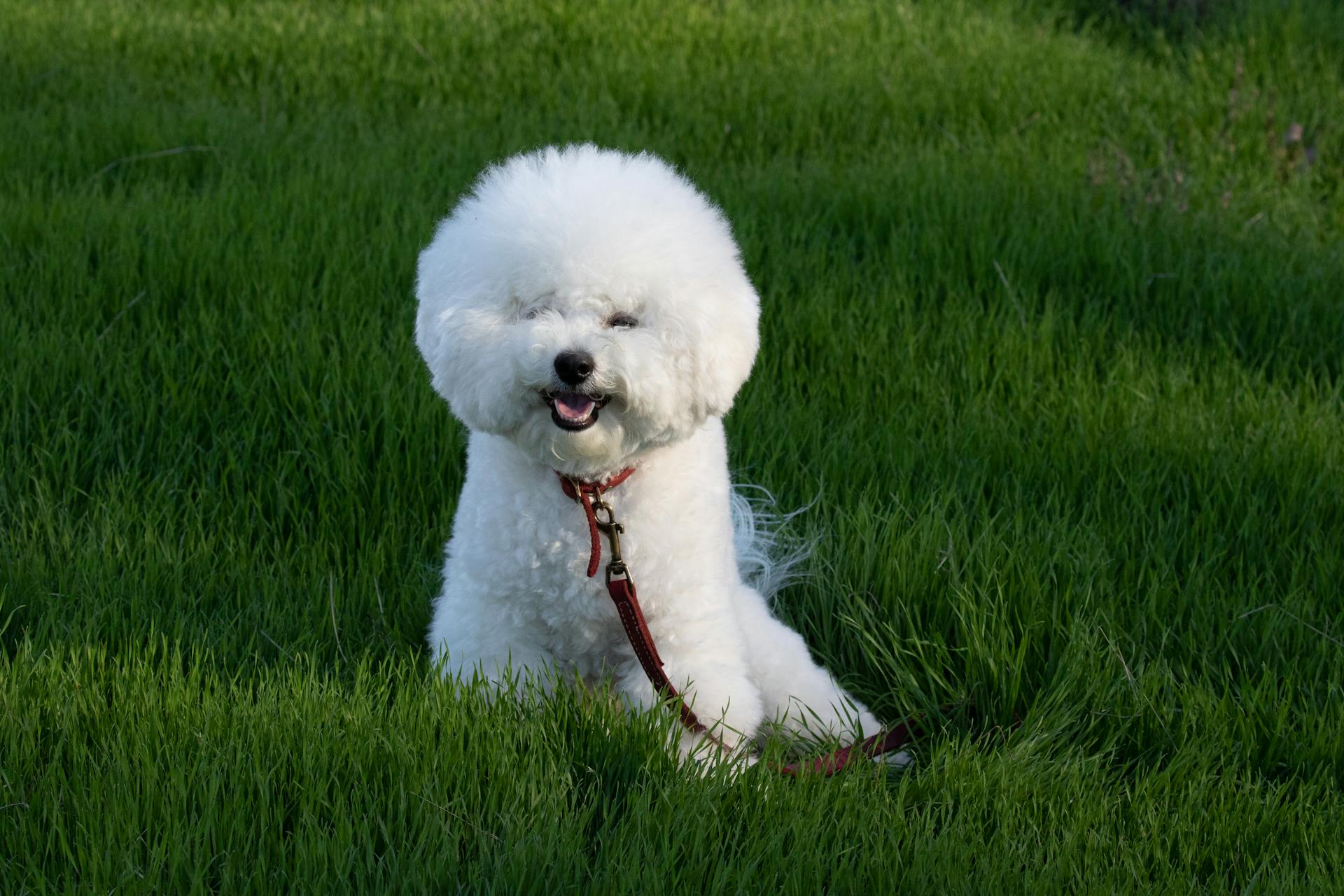
The history of this topic is fascinating and worth exploring.
The earliest recorded evidence dates back to 1850, when a significant event occurred that marked the beginning of its development.
This pivotal moment laid the groundwork for what was to come, shaping the course of events that followed.
Fast forward to 1900, when a major breakthrough took place, revolutionizing the field and paving the way for future innovations.
The years leading up to this point were crucial in laying the foundation for the advancements that would soon follow.
Size
The Bichon Frise is a small dog breed that's perfect for city living.
Males and females stand about 9 to 11 inches tall.
You'll want to make sure you have enough space at home for your new furry friend, but they don't require a huge yard to run around in.
Popularity
The bichon frisé breed has gained significant popularity over the years.
In the American Kennel Club’s annual list of the most popular dog breeds, bichons were the 47th most popular breed in the US in 2021.
Their royal heritage and intelligent temperament have made them a sought-after companion for many, but that's not all - they've also got show-stopping potential.
Breed Variants
The Bichon Frisé is a versatile breed with various colors and breed variants. The American Kennel Club recognizes four distinct colors for this breed.
Some popular breeds that share similarities with the Bichon Frisé are the Havanese, Maltese, Bolognese, Coton de Tulear, and Löwchen. These breeds often have similar characteristics to the Bichon Frisé.
The American Kennel Club currently recognizes four distinct colors of the Bichon: white, white and apricot, white and buff, and white and cream.
Here are some specific breed variants:
- Bichon frisé
- Havanese
- Maltese
- Bolognese
- Coton de Tulear
- Löwchen
These colors are part of the breed standard, making them a great starting point for anyone interested in learning more about this breed.
Socialization and Interaction
Bichons are social butterflies and thrive on attention from their human family members. They get along well with kids of all ages and love spending time with them.
To ensure a harmonious household, it's essential to socialize your bichon as early as possible. This means exposing them to various sights, sounds, smells, and other dogs to help them develop good manners and become confident in new situations.
Bichons are generally very good with other pets, especially if they're introduced together from a young age. They can even play nicely with cats and smaller dog breeds if socialized properly.
Their friendly temperament makes bichons perfect companions for families or individuals who want a low-maintenance but affectionate pet. They'll love being invited to play with other dogs and will often initiate interactions with their human family members.
To make the most of your bichon's social nature, it's crucial to provide them with plenty of opportunities to interact with other dogs, people, and pets from an early age. This will help them develop good social skills and become a well-adjusted member of your household.
Frequently Asked Questions
Is there a difference between a bichon and a Bichon Frise?
Yes, there is a difference between a Bichon and a Bichon Frise: the latter specifically refers to the breed of dog with the distinctive white coat and soft corkscrew curls. The term "Bichon" can refer to any small white dog, but "Bichon Frise" describes a specific type of dog with this unique appearance.
What are the pros and cons of a Bichon Frise?
Pros: Bichons are suitable for apartment living due to their small size and quiet nature. Cons: They require regular coat care and may not be effective watchdogs
Do bichons like to be cuddled?
Yes, Bichon Frises are extremely affectionate and love to cuddle. They thrive on physical touch and attention from their family members.
What two breeds make a Bichon Frise?
A Bichon Frise is a cross between a Water Spaniel and a Standard Poodle. These two breeds were combined with other small white dogs to create this unique breed.
What is special about Bichon Frise?
Bichon Frises are friendly, adaptable companions who thrive in city environments. Their confidence and small size make them ideal pets for families with children or other dogs.
Featured Images: pexels.com
